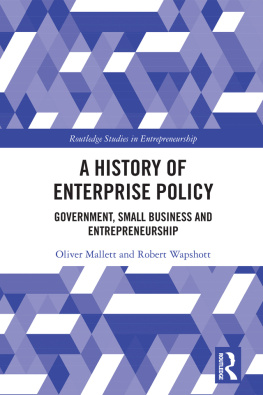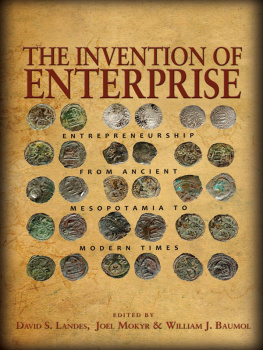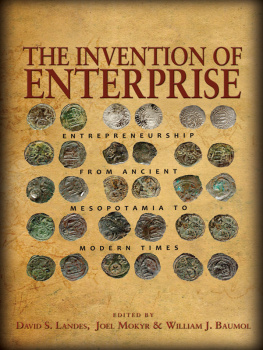A History of Enterprise Policy
Governments in developed and developing economies have increasingly turned to entrepreneurship and small businesses for economic growth, dynamism and economic and social inclusion. Policies seeking to encourage, support or otherwise influence these forms of economic activity are varied but virtually omnipresent, recommended by organisations such as the OECD and World Bank and implemented by governments of many political ideologies. With a range of activities across government labelled as enterprise policy, it is vital to unpick the different policies, initiatives and interventions and to understand their development in order to subject them to scrutiny and evaluate the actions taken in the name of enterprise.
This book provides the first in-depth, historical analysis of enterprise policy in the UK. Successive UK governments have been particularly active, with the number of initiatives estimated recently at 3000 and expenditure reaching as high as 12bn, yet facing continuous criticisms for its use, value or relevance. This historical study of UK enterprise policy represents a case study of different forms of enterprise policy and how they have developed, or failed to develop, over time, contributing to understanding of government, small business and entrepreneurship. It will be of value to researchers, academics, policymakers, and students interested in the history of small business and entrepreneurship as well as standing as a history of a specific policy area and the ways in which policies involving many different areas of government develop over time.
Oliver Mallett in an associate professor in Work and Employment at the University of Stirling, Scotland. Olivers research interests relate to employment relationships in small businesses and to government and private sector support for small businesses.
Robert Wapshott is a senior lecturer in Entrepreneurship at the University of Sheffield, UK, where he is a member of the Centre for Regional Economic and Enterprise Development. Roberts research studies small businesses and entrepreneurship with a particular focus on small business management and on regulation.
Routledge Studies in Entrepreneurship
Edited by Susan Marlow and Janine Swail
(University of Nottingham, UK)
This series extends the meaning and scope of entrepreneurship by capturing new research and enquiry on economic, social, cultural and personal value creation. Entrepreneurship as value creation represents the endeavours of innovative people and organisations in creative environments that open up opportunities for developing new products, new services, new firms and new forms of policy making in different environments seeking sustainable economic growth and social development. In setting this objective the series includes books which cover a diverse range of conceptual, empirical and scholarly topics that both inform the field and push the boundaries of entrepreneurship.
Enterprising Education in UK Higher Education
Challenges for Theory and Practice
Edited by Gary Mulholland and Jason Turner
Social Entrepreneurship and Business Ethics
Understanding the Contribution and Normative Ambivalence of Purpose-driven Venturing
Anica Zeyen and Markus Beckmann
Time, Space and Entrepreneurship
James O. Fiet
Entrepreneurship and Global Cities Diversity, Opportunity and Cosmopolitanism
Edited by Nikolai Mouraviev and Nada K. Kakabadse
A History of Enterprise Policy
Government, Small Business and Entrepreneurship
Oliver Mallett and Robert Wapshott
For more information about this series please visit: www.routledge.com/Routledge-Studies-in-Entrepreneurship/book-series/RSE
A History of Enterprise Policy
Government, Small Business and Entrepreneurship
Oliver Mallett and Robert Wapshott
First published 2020
by Routledge
52 Vanderbilt Avenue, New York, NY 10017
and by Routledge
2 Park Square, Milton Park, Abingdon, Oxon, OX14 4RN
Routledge is an imprint of the Taylor & Francis Group, an informa business
2020 Taylor & Francis
The right of Oliver Mallett and Robert Wapshott to be identified as authors of this work has been asserted by them in accordance with sections 77 and 78 of the Copyright, Designs and Patents Act 1988.
All rights reserved. No part of this book may be reprinted or reproduced or utilised in any form or by any electronic, mechanical, or other means, now known or hereafter invented, including photocopying and recording, or in any information storage or retrieval system, without permission in writing from the publishers.
Trademark notice : Product or corporate names may be trademarks or registered trademarks, and are used only for identification and explanation without intent to infringe.
Library of Congress Cataloging-in-Publication Data
A catalog record for this book has been requested
ISBN: 978-1-138-33730-5 (hbk)
ISBN: 978-0-429-44248-3 (ebk)
Typeset in Sabon
by Apex CoVantage, LLC
Contents
Guide
While as authors we bear ultimate responsibility for our work, undertaking research on such a wide topic necessarily reflects the support (and goodwill) of various people. The research underpinning this book took several years to complete and was supported by our respective colleagues and institutions.
In particular we acknowledge:
The Institute for Small Business & Entrepreneurships Research and Knowledge Exchange fund provided a small grant to study the enterprise industry of business support, which informed some of our thinking. Participants at ISBE annual conferences also provided comment and feedback on early versions of some of the ideas included in the book.
The Department for Business Innovation & Skills (now BEIS) funded a project on the effects of regulation on small businesses.
The University of Sheffield supported a small project on identifying contemporary enterprise policies, which informed the final section of ; thanks to Nazila Wilson for support on this task.
Thanks also go to staff at The National Archives and The British Library (London and Boston Spa) for their assistance in making the most of the fantastic resources they look after.
Oliver would especially like to thank Rebecca, Lacey and Lola for all their love and support.
The classic BBC sitcom Only Fools and Horses features a self-employed market trader (Del Boy) and his work (often within the informal economy) and home life with a younger brother (Rodney) and their elderly grandfather (in later series a great uncle). Del Boy is a stereotypical wheeling and dealing entrepreneur who takes risks, has great ambition and looks for opportunities, seemingly convinced through each scrape and caper that this time next year well be millionaires.
The first episode of the series, broadcast in 1981, includes a scene where Del Boy explains his attitude towards Value Added Tax, and by extension government in general, to Rodney. Del explains that their business gives nothing to government, no income tax or national insurance, and in return they expect government to give nothing back. The story reflects something of a stereotypical portrayal of small businesses and the self-employeds attitudes towards government: they want to be left alone to get on with their business without the impediments of taxes or other burdens such as red tape.









